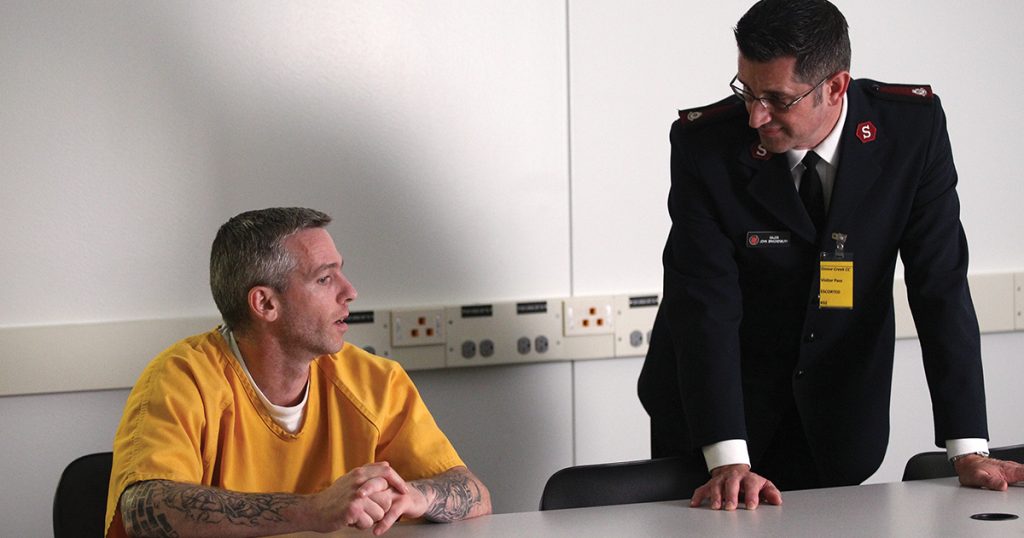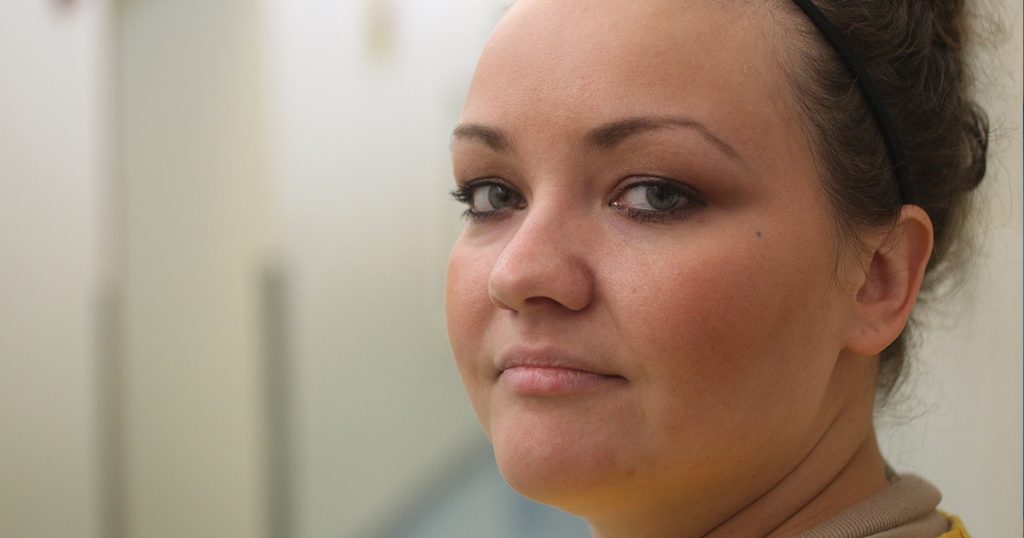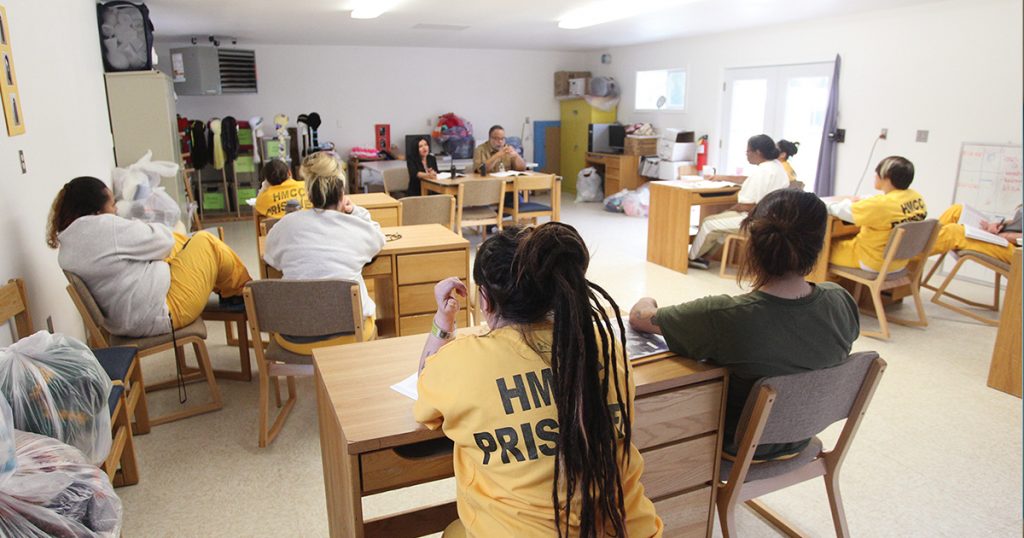Positive Change
The Salvation Army in Alaska is bringing crucial treatment to incarcerated men and women.
About two years ago, The Salvation Army’s Alaska Division decided to respond to a request from the Alaska Department of Corrections to help inmates deal with what is known clinically as a dual diagnosis; mental health problems and substance abuse disorder. The grant was awarded, and the program was implemented at the Goose Creek Correctional Center for men and the Hiland Mountain Correctional Center for women. Both facilities are for low to medium custody incarcerated individuals serving sentences from a few months to life in prison.
Goose Creek Correctional Center is located about 45 minutes from Anchorage. It is the newest correctional facility in Alaska and houses approximately 1,400 men. The facility looks like a regular prison with several fences, electronic locking doors and a military-style layout. However, the facilities are very modern and include amenities such as a complete medical, dental and vision clinic (with trauma stabilization capabilities) and an educational center that includes virtual reality training for trades such as welding and driving heavy construction vehicles, as well as certification programs for electricians, plumbers, carpenters and culinary staff.
The substance use disorder (SUD) treatment is provided through a partnership between the Salvation Army staff and the Alaska Department of Corrections mental health staff. The onsite probation officers are also very involved in the program. At Goose Creek, the SUD treatment is provided as an outpatient program. However, the treatment and other supportive services are provided in a sober living housing module (mod). The facility determined that this living arrangement would provide the best outcomes. Withdrawing the participants from the general population allows them to focus on their treatment plans away from the drugs that—despite the best efforts of the staff to prevent it—are always present in the facility.

The treatment program lasts about 16 weeks. Graduates can then continue to live in the sober living mod or return to the general population in the facility. Those who have almost completed their sentences are also provided with medically assisted treatments. After a thorough medical evaluation, the inmate can receive an injection of Vivitrol, which reduces cravings and blocks the effects of opioids for about 30 days. The shot is given close to their release date, so that they can resist the temptation to use drugs for the first few weeks after their release. They can also obtain follow-up shots if needed. The Vivitrol is made available through a grant that was awarded to the Alaska Department of Corrections.
One participant we spoke to said, “I am very grateful to be able to participate in this program. I graduated from the Adult Rehabilitation Center many years ago but was recently arrested for a DUI. This program is saving my life. Thank you so much for being here.” The correctional officers, probation officers and other staff appreciate the program as well. One staffer stated, “We see The Salvation Army really cares. You treat these men with love and respect. It’s completely different than what we had before.” Everyone we spoke to stated that the sober living module made a huge difference for the success of the program.
Inmates with mental health and substance abuse problems (dual diagnosis) are also able to participate thanks to the partnership with the mental health staff at Goose Creek. The mental health housing module is connected to the sober living module by a “hallway” flanked by the offices of the therapists and Salvation Army staff. This arrangement enables staff members to observe the behavior of mental health clients away from the general population where they might be bullied or preyed upon by other inmates.
The Hiland Mountain facility is located about 15 minutes from Anchorage and houses a little over 400 women. Hiland Mountain is an older facility and is very different from Goose Creek, in that it looks more like a college campus with one fence around it. The ladies live in dorm rooms with wooden doors and a shared living space connecting several wings. The ladies even have keys to their own rooms and are able to go outside in between the three daily body counts and when they are not involved in other activities. Hiland Mountain also offers extensive educational opportunities, including virtual reality training, commercial driver training and instruction in sewing and gardening. The sewing group creates beautiful quilts and articles of clothing for children. These items are sold once per year, with proceeds used to support the community and to purchase more supplies. Some of the ladies donate their income to specific non-profits. According to the staff, one lady donates part of her paycheck to The Salvation Army.

Treatments offered at Hiland Mountain are similar to efforts at the Goose Creek facility. The Salvation Army offers both inpatient and outpatient SUD treatments. There is also the option for dual diagnosis therapy. The inpatient ladies live in a dorm separate from the facility’s general population and the program lasts up to six months. The outpatient program runs about 16 weeks and meets in the same area as the inpatient program, although the ladies in outpatient continue to live in the general population. Hiland also offers the Vivitrol option just prior to release and beyond. The probation officers told us that they can continue to provide Vivitrol shots monthly for several years as needed.
The ladies in the inpatient program attest that separation from the general population was extremely helpful. One lady said, “Now that I’m sober, I finally know who I really am.” Another said, “People were always fighting against me, but now I have someone fighting for me.” Another said, “You can see the change in me,” referring to her joyful disposition. Still another participant said, “The last group (meaning another agency prior to The Salvation Army) was in my face all the time, but The Salvation Army cares about us. Your staff respects us and doesn’t use fear and intimidation.” Sadly, a few weeks prior to The Salvation Army’s arrival at Hiland Mountain, seven women overdosed on drugs in just one day.
A one-year study to evaluate the effectiveness of this program has been completed, but the results are not out yet. However, the facilities have already seen a decline in recidivism (people returning to prison), and good results are anticipated. Based on the success of the partnership, it is hoped that The Salvation Army will explore initiating similar programs in correctional facilities across the country. Naturally, not
all institutions would be able to provide separate sober living housing for those who are in treatment. However, the program appears to be successful in the outpatient format. One of the superintendents in charge stated, “With The Salvation Army, treatment doesn’t stop when participants leave here. You guys are out there providing services that our people can continue to access as long as they need to. We are very happy with The Salvation Army.” In fact, the superintendents in charge of Goose Creek and Hiland Mountain recently flew to the Army’s Western territorial headquarters to participate in the Way Out summit, where they shared their success and encouraged divisional leaders to reach out to their local correctional facilities.
“As a state, we continue to fight high rates of alcoholism and drug abuse—issues that have plagued our communities,” Alaska Department of Corrections Commissioner Dean Williams told the New Frontier Chronicle (www.newfrontierchronicle.org). “Drug and alcohol addiction drive up the crime rate and devastate families. Our inmate population reflects these tragic facts. To fight these issues, we must work together, and we must have these invaluable partnerships.”







